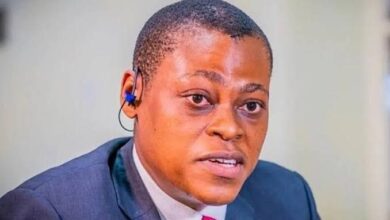News
Mixed reactions follow as Trevor Noah trolls Minister of Agriculture, Audu Ogbeh over his pizza comment (Screenshots)

Patience Oniha, Director-General, Debt Management Office (DMO), says Nigeria’s debt profile is now N24.4trillion having added N2.96trillion to the old debt in the space of a year.
The DG made the revelation on Thursday in Abuja, where its statistics showed that the country’s debt profile which was at N21.725trillion in 2017, had increased by 8.74 per cent. The DMO boss said the funds were borrowed to finance projects, fund budget deficit and meet maturing obligations, noting that 68.18 per cent of the debt are domestic.
Oniha said some foreign debts were borrowed so as to refinance treasury bills because of the short tenor of the bills. She went on to say that the CBN Official Exchange Rate of US$1/N306 as at December 31, 2017 and US$1/ N307.00 as at December 31, 2018 were used for the exchange of external debt stock to Nigerian currency.
According to the DMO boss, N331.12billion promissory notes issued to oil marketing companies and state governments in December 2018 are part of the government’s domestic debt stock. She revealed that the country’s Debt Management Strategy, which had some targets set, had been almost achieved.
This includes the plan to achieve a tenor of 75:25 ratio and that the target had been passed because the country now had a 78:22 ratio in favour of long term debts. She said: “The share of domestic debt dropped to 68.18 per cent from 73.36 per cent as of December 31, 2017, thereby achieving a mix of 68.18 per cent and 31.82 per cent in the debt stock.
“Some of the objectives were to create more space for other borrowers in the domestic market, extend the average tenor of the debt stock in order to reduce refinancing risk and increase external reserves.
The implementation of the strategy led to an injection of N855billion through the redemption of Nigerian Treasury Bills in 2018 and a general drop in the FGN’s borrowing rate in the domestic market from over 18 per cent per annum in 2017 to 14 to 15 per cent per annum in 2018.”
The DMO boss also said borrowing for 2019 would be split 50-50 between domestic and external in line with the Debt Management Strategy 2013-2019.
She said: “Relatively low-interest rates mean the government can issue longer-dated bonds to continue to fund infrastructure projects. “Revenue generating initiatives are expected to improve revenues and reduce the debt service to revenue ratio.”
Speaking on the issuance of promissory notes, Oniha said: “The Federal Executive Council approved the establishment of a Promissory Note Programme. The purpose is to use it to settle inherited local debts and contractual obligations of the Federal Government. The programme is estimated at N3.4tn. It will provide stimulus to the economy and unlock investment across a number of sectors currently having liquidity issues.”
Nigeria’s debt profile since Buhari came to power in 2015 are as follows: 2015, N1.457trillion; 2016, not available; 2017, N2.321trillion; 2018, N1.643trillion; and 2019 (as proposed) N1.649trillion.




